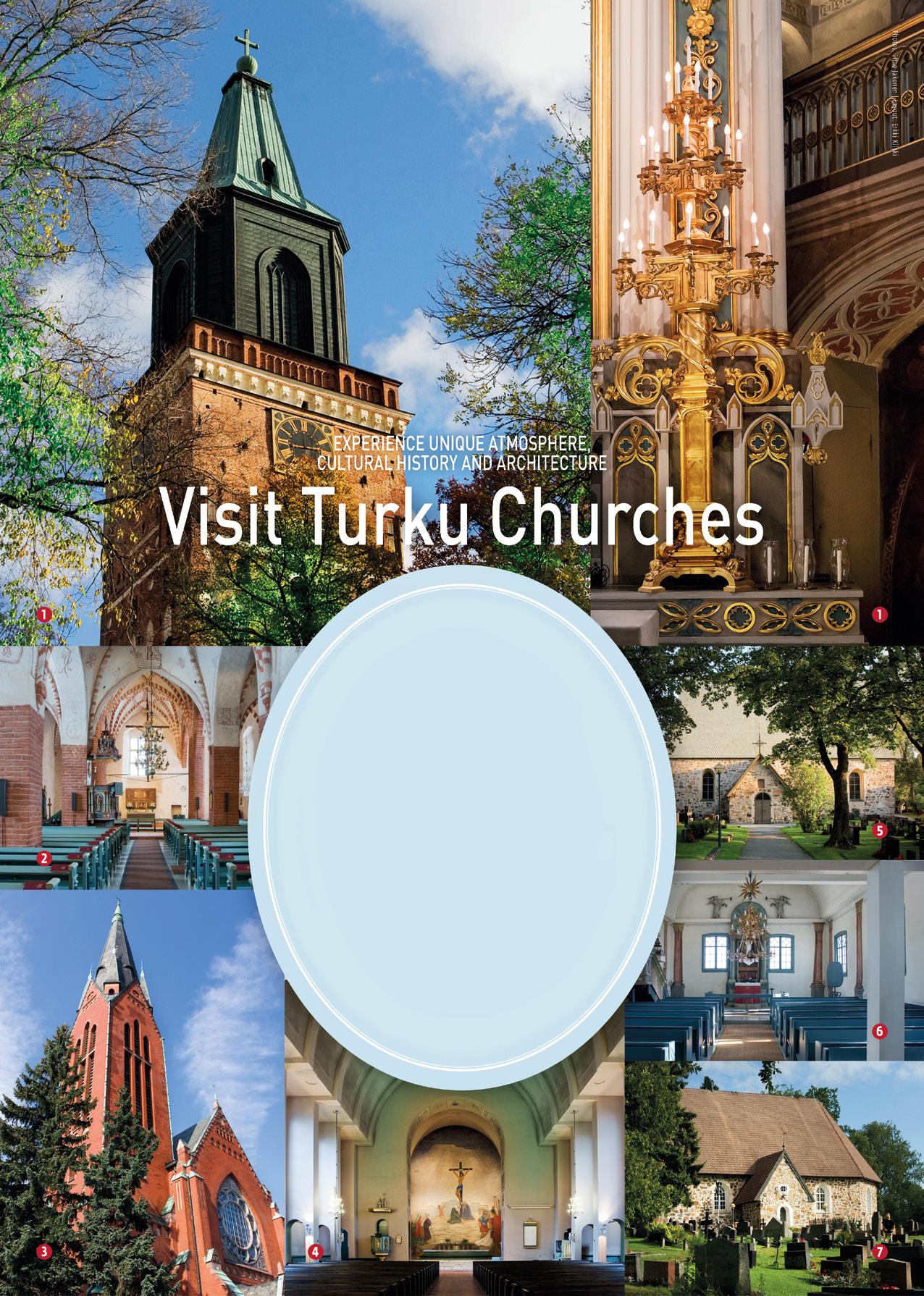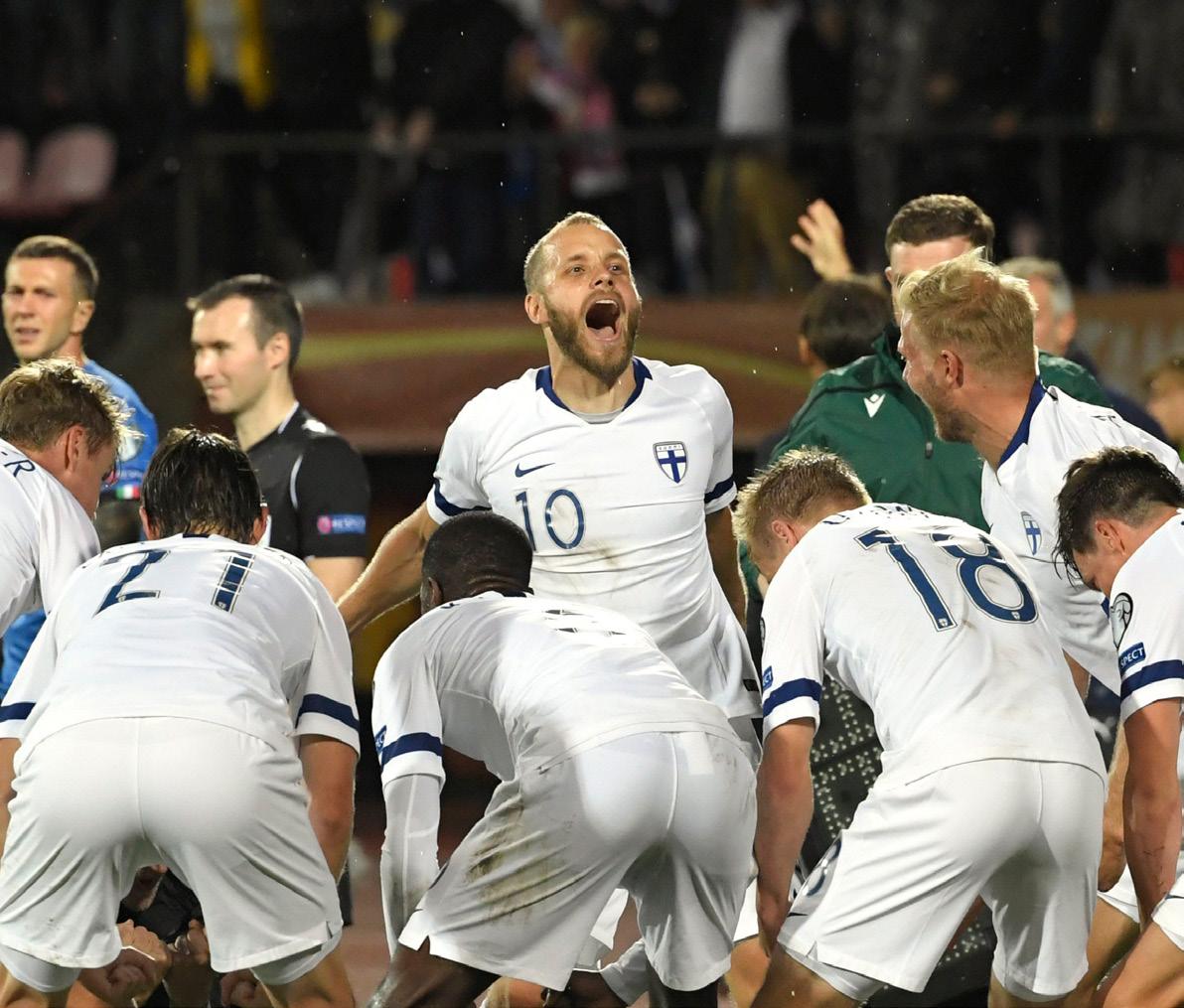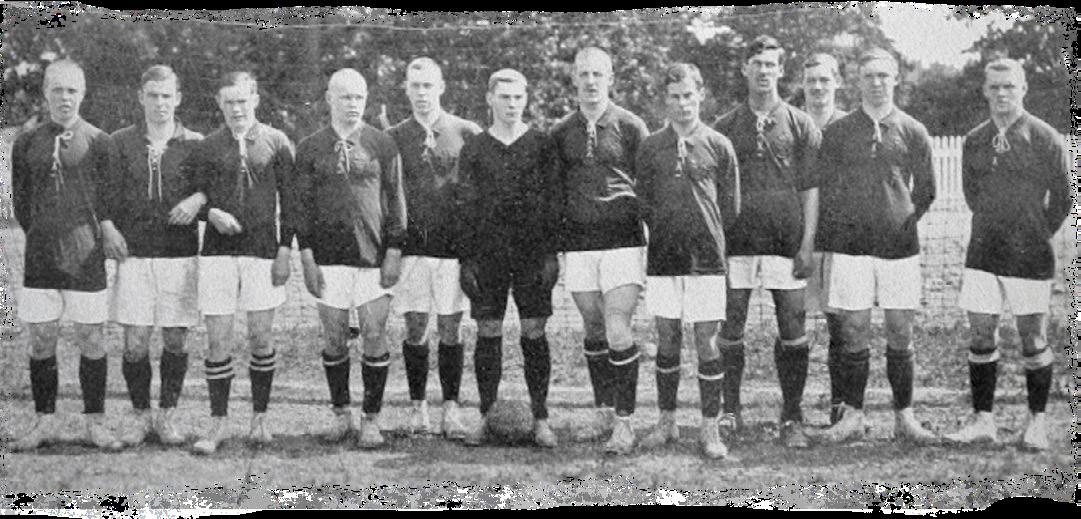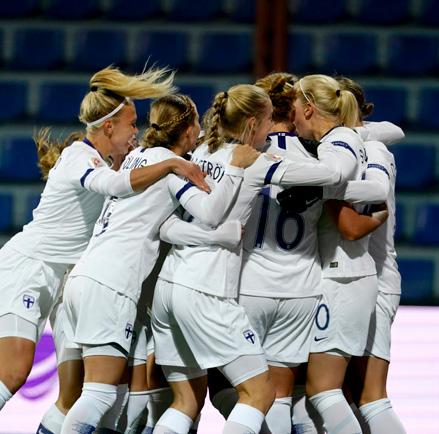
8 minute read
Welcome to Turku
Turku wants to offer its best not only to its citizens but also to tourists, whether it is a question of holiday, business, training or a congress.
Turku is the oldest city in Finland. We are taking advantage of our history though we are looking to the future. In 2029 we will celebrate the 800th anniversary of Turku, and the city is already preparing for the jubilee year in numerous ways, of which I am here presenting two:
Advertisement
• The most visible project at the moment is the large-scale renovation of the market square in the city centre. After a couple of years we will have in our centre an attractive car-free market square with its splendid pedestrian, cycling and recreational facilities.
• The target of Turku is to be a carbon neutral city in its jubilee year and after that a climate positive city. We reach the target in cooperation with the citizens and the communities of the city.
So, I am also inviting you to participate in our joint effort to combat climate change, for example, by favouring delicious and clean local food.
Turku is a small large city. There are around 200,000 residents in Turku. However, there are six universities in the city and around 40,000 students and university teachers. This guarantees that we have wide-ranging know-how in the city. Our universities are international, and the only Swedish university in Finland, Åbo Akademi, is the gem of the city.
The cooperation between the universities, the city and the businesses aims to make Turku and the Turku region grow at the top of development in the Baltic Sea region. The long-term cooperation for its part has raised the Turku region to be the engine of economic growth in Finland. The spearhead fields in Turku are marine technology, bio and circular economy, health and well-being, manufacturing and technology industry and creative fields.
City by the river and the sea
The River Aura is the heart of Turku. You get to know Turku easier by walking or cycling along the riverside. The route from the Turku Cathedral to Turku Castle is steeped in history and life. By the river there is beautiful scenery, museums and a magnificent main library as well as cosy and high-quality cafés and restaurants where to have a break.
Shops and department stores are close to one another in the city centre. As souvenirs I recommend design of Turku origin, such as high-quality textiles which are light to carry home. It is also worth visiting the traditional market hall where to taste local delicacies and specialties.
The sea and nature are inseparable part of Turku. On Ruissalo island off the city the mind rests all seasons. The island is famous for villas from the 19th century, oak forests, a beach, nature trails and Ruisrock Festival. You can easily get to the island by Föli’s citybike, bus and in the summertime also by Föli’s water-bus.
For culture lovers Turku offers lots of interesting events like concerts, theatre, fairs, art exhibitions and festivals all year round but in the summer season to come you can also enjoy unique outdoor events.
I am a native of Turku and the city is everything to me. That is why I wish that Turku would touch every visitor beneath the surface and would make the visitor come again. s

TEAM’S LONG JOURNEY INTO THE PROMISED LAND
Green green grass of UEFA European Championship

November 15th 2019 may have been a small day for mankind, but it was a giant leap for Finland. On that day the Finnish national football team ensured its place in the UEFA Euro 2020 by defeating Liechtenstein 3-0 in a home match. It was a miracle equalling to Lordi’s Eurovision Song Contest win in 2006 and Finland’s first Ice Hockey World Championship in 1995.
Written by Matti Mäkelä Translated by Anna Eloaho T he road to the promised land had been long and rocky for the ”Eagle Owls”, The Finnish Men’s Football Team. (It is important to remember that the cause for concern in Finnish sports has for decades been the men’s national football team, the women’s team has made it to the European games several times; in 2005 they even took the divided third place). Yet the very beginning of that road was promising for men as well. The national football team took part in the Olympics of 1912 in Stockholm and made it to the semi-finals by defeating such countries as Russia and Italy. At the time Finland was the Grand Duchy of Russia, so victory over the suppressing mother nation was especially sweet.
An indication of what was to come was seen in the 9-0 loss against Holland after a somewhat decent 0-4 result against England. In a bronze medal game the entire Finnish team was tired, and according to a legend, also suffering a hangover. The next century was marked by more and more bitter, even humiliating defeats. Finland could but envy and observe the success of Sweden, Denmark and Norway. Even tiny Iceland has had its moments of glory in the eyes of the world. A sign of these desperate times can be seen in a 1977 Finnish Football yearbook, where Kai Haaskivi’s goal against Italy is touted. The fact that Italy scored six goals against Finland in that match was left to lesser attention.

Finnish national football team in the 1912 Stockholm Olympic Games.
Finnish football team did take part in Helsinki Olympic Games of 1952 as well as Moscow in 1980. Yet the value of these achievements is somewhat diminished by the fact that as the hosts we qualified automatically to the first event and the widespread boycott towards the latter improved our odds remarkably. There was hardly any success, in Helsinki Finland dropped out during the first round and in Moscow during the group stages.
It is a fact generally acknowledged that the genuine tournaments of substance are the European Championship and the World Cup, where the Finnish team’s chances have usually been that of a snowball in hell, despite the bittersweet fact that a couple of times we have been close to the dream becoming true.
In 1997 Finland was already on its way to the last round of World Cup qualifying games, but an over-time own goal silenced the crowds at the Olympic Stadium in Helsinki and sent Hungary forward. In 2007 against Portugal Finland was only one goal short to ensure its place in European Championship tournament. One precious goal that never came.
In the past sources of joy for the Finnish football fans were mostly some lone and successful individuals. For example, Jari Litmanen and Sami Hyypiä were world-class players and their success in European leagues shed light on Finnish football, but even their input in the national team was never enough.
In the previous World Cup qualifying games Finland qualified fifth in its group, next to last, and got a mere nine points in ten games. The miserable outcome caused Finland to drop below all other Nordic countries and even Faroe Islands in FIFA ranking (in 2017 Faroe Islands had a population of 49 920, which means that during a major influenza epidemic they would have problems to even assemble a team). After that disaster only the most devoted optimists had faith in Finland’s chances in the European Championships, despite the fact that qualifying in European Championships is much easier than in World Cup.
Then everything changed. Markku Kanerva became the head coach and Finland started winning. The success in the Nations League (winner in their group) was followed by UEFA Euro qualifying games, where Finland was second in their group after Italy. Left behind was, among others, the 2004 European Champion Greece. The incredible change was explained by the functional playstyle, the improved self-esteem after the wins in Nations League and of course by Teemu Pukki who was the fifth best striker of the whole qualifying round with his 10 goals (out of Finland’s 16 goals). Pukki was also the best striker in England’s Championship League in the season 2018–2019. Last January Pukki, who is now Premier league player of Norwich, was elected the Finnish
Athlete of the Year in 2019.
Although the rise of the National Football team may seem like an incredible dream, yet it is a logical step in the change of Finnish society and sports as a whole. For a long time Finnish narrative had been an epic telling of the achievements of the lone and silent heroes. Then came the teams, collaboration and team players. First ice hockey, then basketball and volleyball, finally football.
What is going to happen to Finland in the
European Championship games? Many think that the biggest accomplishment is just to be there and that our chances against Denmark and Russia are extremely slim, let alone Belgium. Maybe so, but the history of football is full of miracle stories about victorious underdogs with no prior pressure or expectations whatsoever. A prime example is Iceland in the previous European Championship games. Iceland made it’s way to the quarterfinals and unhorsed the mighty England with 2-1 (match which was played four days after the Brexit vote, which perhaps explains the English team’s total confusion). Being the runner up suits Finland. Let’s not forget the Winter War or our 2019 winning Ice Hockey World Championships team, a team that was considered to be the worst in history by many sports writers before the games. s The Finnish players celebrate a goal in the UEFA Women’s Euro qualification match against Albania in Vaasa in October 2019. photo: Timo Aalto / Lehtikuva THE INCREDIBLE CHANGE WAS EXPLAINED BY THE FUNCTIONAL PLAYSTYLE, THE IMPROVED SELFESTEEM AFTER THE WINS IN NATIONS LEAGUE AND OF COURSE BY TEEMU PUKKI. UEFA has postponed the European Championship until 2021.



